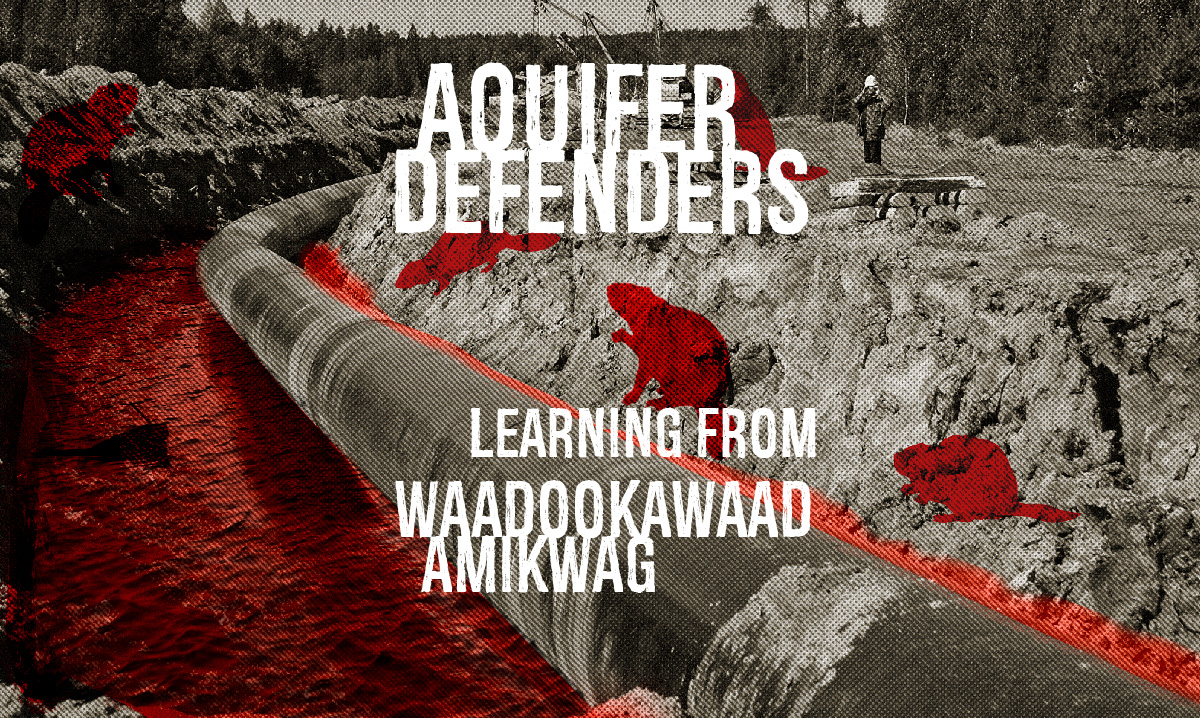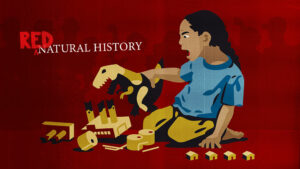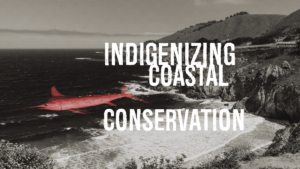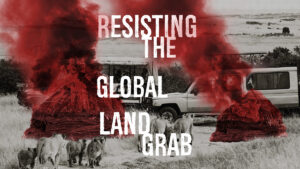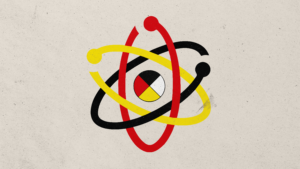How can Indigenous knowledge and Western science be mobilized in combination to halt the destruction caused by pipelines and other toxic infrastructure, stop future projects, and protect the land and water for future generations?
This was a key question at last week’s “Aquifer Defender,” a virtual workshop and roundtable on the ambitious work of Waadookawaad Amikwag (‘Those Who Help Beaver’), a diverse group of water protectors, scientists, drone pilots, field monitors, and grassroots organizers who are building an evidence-based case against the recently constructed Line 3 pipeline.
Featuring members of Waadookawaad Amikwag in conversation with critical geographer Kai Bosworth, this event offered a case study in how community science can be done ethically, accountably, and impactfully.
Watch the video recording, and check out the chat transcript and some key resources from Waadookawaad Amikwag, below.
Documenting dozens of aquifer breaches along the pipeline route, as well as a systematic lack of tribal consultation by government agencies, Waadookawaad Amikwag is building an incriminating catalog of corporate influence on land management in the Midwest.
By combining the experience and insights of the Anishnabeg, who have lived on and with the land for generations, with new skills and capacities developed within the applied disciplines of geology, engineering, and the environmental sciences, Waadookawaad Amikwag is producing new and powerful tools to protect the land, water and our collective future.
This was the fourth event in our ongoing programming series, Natural History for a World in Crisis, curated by the 2023–2025 cohort of Red Natural History Fellows.
Learning from Waadookawaad Amikwag: Resources and Tools
During the “Aquifer Defenders” workshop and roundtable, Waadookawaad Amikwag’s Victoria M.L. McMillen (Migizi Clan, Anishinaabeg Nagachiwaanong), Jami Gaither, and Jeff Broberg referenced a host of documents and resources they’ve developed in their investigation into aquifer breaches and other violations caused by Enbridge Line 3. To dive deeper into their work, check out this round-up of resources:
Organizations:
- Waadookawaad Amikwag’s website: https://waadookawaadamikwag.org/
- People Not Polluters: https://waadookawaadamikwag.org/people-not-polluters
- Watch the Line MN: https://watchthelinemn.org/
- Center for Applied Environmental Science (CAES): https://caes.info/about/
News and Investigative Reports:
- Short video on the origins of Waadookawaad Amikwag and the Line 3 fight: https://youtu.be/-9VIXaO4AJs
- Scott Broberg’s blog on the coordination of law enforcement, Enbridge, and the Minnesota Public Utilities Commission: https://healingmnstories.wordpress.com/2022/06/10/final-payout-from-the-enbridge-line-3-public-safety-escrow-account-8-5-million/
- Report on aquifer ruptures along Line 3 in northern Minnesota: https://www.startribune.com/enbridge-aquifer-water-oil-pipeline-line-3-environment-climate-change-aitkin-county-moose-lake-peat/600293054/
Data and Fact Sheets:
- Summary report on Waadookawaad Amikwag’s investigation of damages caused by the Line 3 buildout:https://waadookawaadamikwag.wordpress.com/wp-content/uploads/2023/07/july-2023-one-pager-summary.pdf
- Fact sheet on how how oil pipeline construction can impact underground aquifers: https://waadookawaadamikwag.wordpress.com/wp-content/uploads/2023/07/july-2023-hydrologic-disruption-paradigms_fact-sheet.pdf
- Wadookawaad Amikwag’s site surveys: https://waadookawaadamikwag.org/sites-2023
- Information about the environmental impact of Carbon Capture Utilization and Storage Pipelines in Minnesota, and what you can do to stop them: https://curemn.org/carbon-pipelines-mn/
Video Resources:
- Waadookawaad Amikwag’s Website Walkthrough: https://youtu.be/u4bXHUuvd9Q
- Presentation on aquifer breaches to Clearwater County Board of Commissioners in December 2022: https://youtu.be/XtUWBb-wgRA?si=ltFFwewXWGSDhvAo
- Video resources on the Tamarack Sulfide Mine from Tamarack Water Alliance: https://tamarackwateralliance.org/resources.html#videos
Take Action:
- People Not Polluters Petition: https://actionnetwork.org/petitions/people-not-polluters
What is Red Natural History? Video Interview with Kai Bosworth
Red Natural History Fellow and geographer Kai Bosworth has spent the past decade studying the landscape of contemporary environmentalism, exploring the tenuous alliances formed in opposition to pipeline infrastructure in the Midwest. Check out our new video interview and written transcript with Bosworth, where he explains how radical geographic practices were developed in response to his discipline’s imperialist history, drawing critical lessons for emergent practices of “red natural history.”

